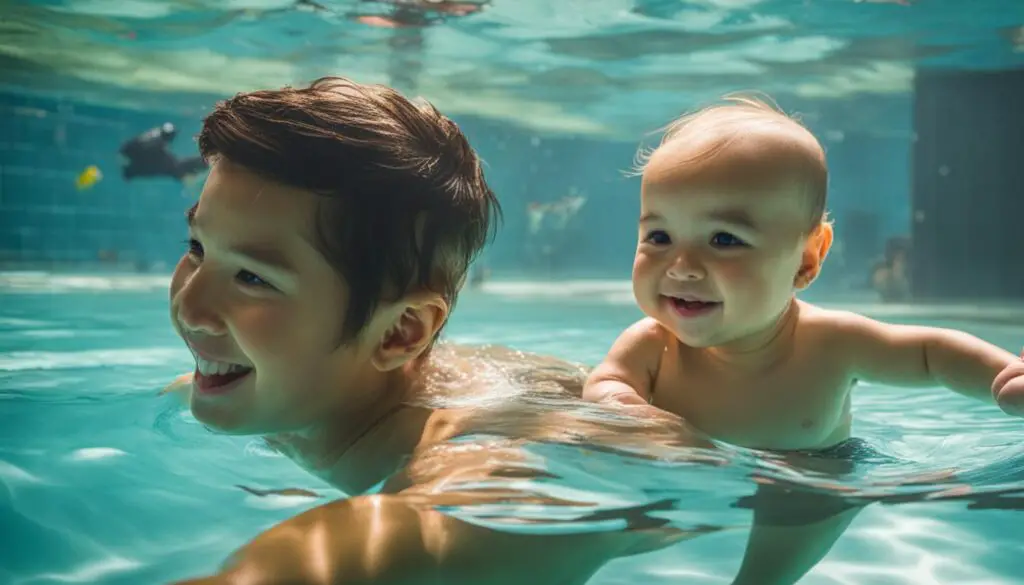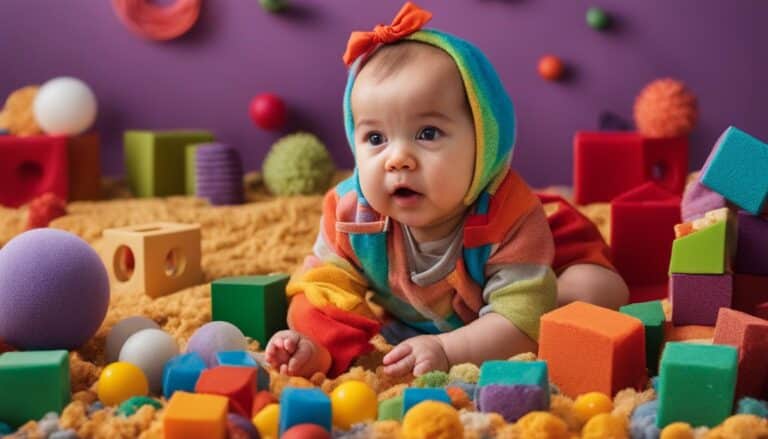The Benefits of Baby Swimming Classes
Welcome to our article on the benefits of baby swimming classes. Infant swim lessons are not only an enjoyable activity but also provide numerous advantages for babies and their families. In this section, we will discuss how baby swimming classes can reduce the risk of drowning, improve coordination and balance, enhance strength, and promote bonding and social skills. Let’s dive in!
Key Takeaways:
- Starting baby swimming classes at six months can reduce the risk of drowning, a leading cause of death for children aged 1-4.
- Baby swimming classes help improve coordination and balance through kicking movements, leading to better balance even at age five.
- Swimming as exercise strengthens joints, muscles, and the cardiovascular system, promoting overall strength and health.
- Participating in swimming classes allows for bonding between parents and babies, strengthening the parent-child relationship.
- Swimming classes also provide opportunities for social interaction with instructors and other children, fostering important social skills and friendships.
Reducing the Risk of Drowning
One of the most significant benefits of starting infant swim lessons at six months is the reduction of the risk of drowning. Drowning is a leading cause of death for children aged 1-4, and young children are particularly vulnerable, especially in home swimming pools. By enrolling babies in infant swim lessons, such as the Teddy Bear Program, parents can equip their children with vital survival skills and enhance their water safety.
The Teddy Bear Program is designed to teach infants and young children how to handle water emergencies. Through a progressive curriculum, babies learn comfort and confidence in the water, as well as propulsion and independence. The program culminates with the Flip to Breathe technique, where children master the skill of flipping to their back to breathe and then returning to swim on their tummies. They also learn essential skills such as swimming to the wall and performing a Tummy Pool Exit, ensuring their safety in water.
By providing infants with the skills they need to respond to potential water emergencies, infant swim lessons significantly reduce the risk of drowning. This early exposure to water safety and survival skills can be life-saving, giving parents peace of mind and keeping their little ones safe around water.

| Benefits of Infant Swim Lessons for Water Safety | Teddy Bear Program |
|---|---|
| Reduces the risk of drowning | Teaches survival skills |
| Enhances water safety awareness | Focuses on comfort and confidence |
| Builds resilience and independence | Develops propulsion skills |
| Teaches Flip to Breathe technique | Helps children master back-floating and returning to swimming |
| Equips children with Tummy Pool Exit skill | Ensures safe exits from the pool |
Improving Coordination and Strength
Baby swimming classes not only provide a fun and enjoyable experience for infants but also offer numerous benefits for their coordination and strength development. Through kicking movements in the water, babies learn to coordinate both sides of their bodies, improving their overall coordination and balance.
Studies have shown that children who participate in swimming lessons as babies continue to have better balance than their peers at age five. The resistance of the water challenges their muscles and encourages them to develop better control over their movements. As a result, swimming serves as an effective form of exercise for babies, enhancing their joint and muscle strength.
With each movement in the water, babies engage their entire body, from their arms and legs to their core muscles. The continuous resistance provided by the water helps to strengthen their joints while simultaneously building muscle tone. This development of strength at such an early age sets a solid foundation for their physical growth and overall health.
| Benefits of Baby Swimming Classes for Coordination and Strength |
|---|
| Improved coordination and balance through kicking movements in the water |
| Better balance compared to peers at the age of five |
| Enhanced joint and muscle strength through resistance provided by the water |
Swimming not only offers a low-impact exercise option for babies but also promotes the development of their cardiovascular system, leading to improved overall strength and endurance. As they propel themselves through the water, their heart and lungs work harder, increasing their stamina and capacity.
Overall, baby swimming classes provide a unique opportunity for infants to develop coordination, balance, and strength at an early age. The combination of water resistance and coordinated movements helps to build muscle tone and joint strength, setting a strong foundation for their physical development. By introducing babies to swimming as exercise, parents can give their children a head start in building a healthy and active lifestyle.
Enhancing Bonding and Social Skills
Baby swimming classes offer valuable opportunities for bonding and social interaction, benefiting both parents and babies. The parent’s active participation in swim lessons creates a special one-on-one bonding time, strengthening the parent-child relationship and fostering a sense of trust and security. Through shared experiences in the water, parents and babies build deep connections that extend beyond the pool.
Moreover, swimming lessons provide a platform for social engagement with instructors and other children. Babies have the chance to interact, play, and learn alongside their peers, creating a supportive and stimulating environment. These interactions help develop social skills and build early friendships, as babies share the joy and excitement of learning to swim together.
Furthermore, family swim times are a wonderful opportunity for the entire family to bond and engage in fun activities together. Participating in swimming as a family unit not only strengthens family relationships but also creates lasting memories and traditions. It offers a space for shared experiences, laughter, and quality time spent enjoying the water as a family.
By promoting bonding and social skills, baby swimming classes empower babies to develop trust, confidence, and a sense of belonging. These skills are not only crucial in the pool but also translate into various aspects of life as children grow and interact with others. Swimming lessons provide a foundation for building meaningful connections, fostering friendships, and nurturing social-emotional development.
FAQ
At what age can babies start swim lessons?
Babies can start swim lessons as early as six months old.
How do infant swim lessons reduce the risk of drowning?
Infant swim lessons focus on teaching survival skills in water emergencies, such as the Flip to Breathe technique and Tummy Pool Exit, ensuring the safety of babies in water.
What are the benefits of baby swimming classes for coordination and balance?
Baby swimming classes help improve coordination and balance through kicking movements and studies have shown that children who learned to swim as babies have better balance at age five.
Can swimming classes improve strength?
Yes, swimming is a great form of exercise for babies and strengthens their joints, muscles, heart, and lungs.
Do baby swimming classes promote bonding and social skills?
Yes, parent participation in swim lessons allows for one-on-one bonding time and swimming classes provide opportunities for social interaction with instructors and other children, fostering important social skills.






